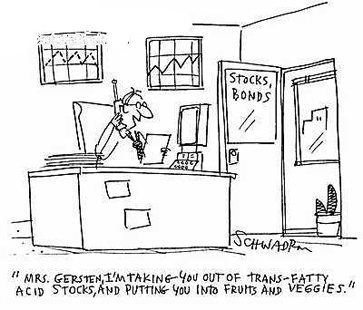Can anyone tell me how much money you would need to make a living on the stock market I have been trading now for 2 years and would like to trade full-time?
 |
This is a question I've been asked before. This is not a categorical answer and opinions vary on how much capital is required. In the end it comes down to the success of your own risk/ratio and what you can afford to lose against what you NEED to gain to make a living. Only you have the answer to that question.
There is not an easy answer as obviously everyone has differing amounts they need to 'survive' in terms of mortgages, dependants...etc. Having said that, I was thrust into the unknown (otherwise I probably would never have been brave enough to take that step) world of trading for a 'living' after being made redundant years ago. I only worked part-time but with a small pot of money to begin with which I could afford to lose, lots of patience, enjoying a new challenge and being prepared to bank each small profit (often through spreadtrading - tax free) I have managed to survive!
One major lesson I have learnt, is to make stop losses large enough to be viable. In the early days I lost through fear of gathering large losses in my spread trading and sold my losses far too early instead of watching and waiting for the market to turn. As I remember reading, the great Jesse Livermore said 'It was never my thinking that made the big money for me, it always was my sitting'. Patience is an essential virtue in equities, as long as you had the correct reasons for buying in the beginning of course! Never buy on a whim, but don't underestimate that gut feeling either on occasions.
Instead of focusing on the amount invested in the markets, all I can say is, a profit is a profit, when a stock rises 10% it doesn't matter if you invested £1000 or £100,000 you still make 10% on your investment, so everyone is happy.
You can make a living through shares trading but it takes time to acquire the knowledge. First one is seduced by Penny shares which promise huge % rises. Next one is attracted to quick win 'Day Trading' systems etc...perhaps trading. Sure you can get lucky e.g. KMR, but projects can easily get delayed and before you know it 12 months have passed and you're still waiting, e.g. Minco! Today I mostly trade wider trends using highly liquid, large cap stocks which are traded 1000's of times a day by the banks, funds...etc.
It's a case of 'buy high and sell higher' and of course 'the trend is your friend'. Never buy a share just because it is cheap - it can get a lot cheaper! Same for a rising price - no such thing as it can't go higher. Of course penny shares will always have a place, say in 10% of a portfolio. But they should be the exception NOT the rule. As long as you cut your losses short and let you profits run, you will make money. However you need to apply a strict stop loss, say 7% - 9% from your entry point. And you leave it with your broker so it will be executed automatically and without you being able to change your mind. Turn off your monitor and stop looking at live prices. That's what I've learnt! Even if you go wrong 7 times out of 10 (or more) on your stock picking, as long as you apply the above discipline you will make money. I prefer to let my profits run, the reason being you need to cover costs, i.e. the OTHER losing trades!
Also, try not to average down or add to a losing share. Keep it running of course assuming that your stop loss has not yet been hit. And rather, try and ADD to winning positions, those that are really going up. The reason behind this is that the smart money will be doing the same.
Also, you can increase your chances of success by trading with say, 'sector rotation'. The big money moves in and out of sectors. You just need to be aware and take advantage. Recently money came out of energy and in to the more defensive stocks e.g. banks. It's one of the reasons why the Dow has taken off of late, money was rotating in there from smaller caps after the market recently decided to reassess risk, figuring that while these companies may not double overnight, neither will they halve.
A simple moving average trend following system will NEVER get you in at the bottom since these systems never buy a falling share price. Nor will they get you out at the top. The aim is to grab the chunk in the middle. But you will have the vast majority of the market's MONEY trading in your direction and moves up can be swift.
Also, the best way for small personal investors is to trade is using guaranteed stop losses via CFDs. They are like an insurance policy costing around 0.03% of the total position payable upfront - which is peanuts. Even if the whole market crashes due to say a terrorist attack, your chosen stop loss will be honored.
Just respect the leverage and obey your rules and over time you will make money.
The content of this site is copyright 2016 Financial Spread Betting Ltd. Please contact us if you wish to reproduce any of it.